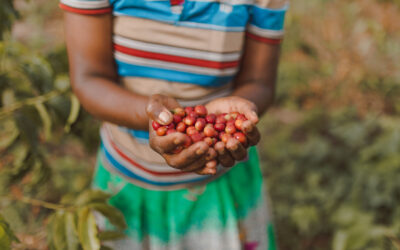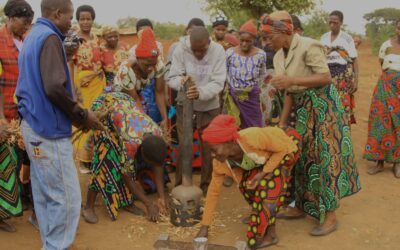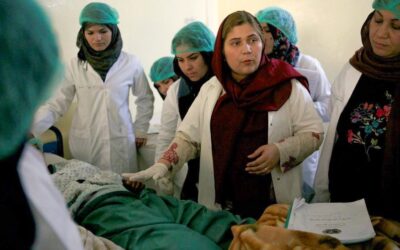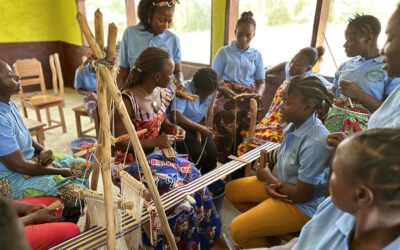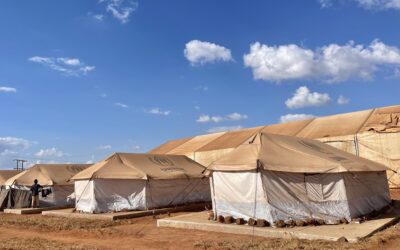Global Hunger: Toward an Integrated Response
The world has made a lot of progress toward reducing global hunger over the last century. Still, around 735 million people experienced hunger in 2022, and the numbers grew over the last few years due to conflict, climate change and COVID (FAO 2023). To work toward alleviating hunger, One Day’s Wages partners with grassroots organizations – like Rain for the Sahel and Sahara – in some of the most under-served parts of the globe. RAIN’s Executive Director, Katherine Kolios, in consultation with RAIN’s team of experts in Niger, took time to share with us about their work alongside communities experiencing hunger.
In the rural areas of Niger where RAIN works, how do community members experience hunger?
People with few resources are smart about stretching their resources as far as they can. When experiencing food shortages, people commonly first cut out higher-price items like meat. The next thing we see is that people cut down on the frequency of their meals, to either 2 meals or just 1 meal a day. In pastoral communities, families take what’s locally available – like camel’s milk – and mix it with a bit of something else to stretch a meal.
Many people experience hunger even when food is available in the market, simply because they can’t afford it. Factors like COVID and the war in Ukraine impacted supply chains in Africa, and caused food prices to increase. After the recent coup in Niger, the cost of rice went up 17% in just one week. Year-over-year inflation has made it very challenging for people in rural areas to afford many food items.
In your experience, what are some ways that community members are able to improve their families’ food security?
RAIN works primarily in Niger’s Agadez region, which is a large but highly under-served area since communities are so dispersed and isolated. Most people in the region are traditionally nomadic or pastoral, and they have never had development support before. One of the biggest barriers to having enough food is water. Because Agadez is in the Sahara, at most there is just one season when people can practice rainfed agriculture. To grow for more than one season, you need irrigation and a well deep enough to reach an aquifer.
In areas where it’s feasible to construct a water source, we support communities to install wells and community gardens. Both the wells and gardens are designed in tandem to be community assets with locally-elected management committees and funding mechanisms to support repairs. Irrigated gardens allow people to grow food throughout the year.
How do community gardens enable people to improve their food security and nutrition?
When people are no longer dependent only on rain-fed agriculture, they can grow crops for both consumption and for sale. Our team helps people think through their families’ nutritional needs, and how to incorporate more nutrient-dense foods into their base foods. But we also provide training in business planning, so that people can consider what has a good market price and which crops can store well for sale.
Through the community gardens we’ve found that people are able to eat both an increased quantity of food and an increased diversity of food. The gardens also allow people to increase their income so they can purchase additional food or household items.
Is there anything else you would like to share, for those of us interested in learning more about how to address global hunger?
For so long people have looked at issues in a very siloed way. To have an effective hunger program, you need to look at the issue holistically. For example, one of the women who grows food at a community garden supported by RAIN now has more food to take to market, which means that her family had more income for her son to purchase a motorbike to take food to market. In turn, employment for youth has a direct impact on regional peace-building and stability. Problems are interconnected, so solutions also need to be interconnected.
More stories of impact
When Generosity Sounds Like a Song: An Invitation to Create Together
At One Day’s Wages, we are endlessly inspired by what happens when people bring their full selves—their creativity, curiosity, and courage—into a shared mission. Our work to alleviate extreme poverty has always been built on partnership. Not just with grassroots...
Ways to Give: Simple, Meaningful Options That Fit Your Life
Generosity isn’t one-size-fits-all. At One Day’s Wages, we believe giving should feel accessible, thoughtful, and aligned with your real life—whether you’re just starting out, raising a family, building a business, or planning your legacy. Here are several ways our...
Starting With Strengths: How Asset-Based Development Can Transform Communities
When people talk about community development, the conversation often begins by listing what’s missing: clean water, farming knowledge, health clinics, and more. And while understanding needs is important, defining communities by their needs can paint them as passive,...
One Day’s Wages Named Together Women Rise 2026 Featured Grantee for Maternal Health Work in Afghanistan
One Day’s Wages (ODW) is honored to announce its selection as the 2026 Featured Grantee of Together Women Rise, a powerful global community of women and allies committed to advancing gender equality. This prestigious award includes a $50,000 grant over two years...
Women at Work: Toward Inclusion in the Global Workforce
Can you remember the last time you couldn’t make it to work? Maybe your nanny canceled, and you were left without childcare. Or maybe your car battery died, and you didn’t have a safe way to get to the office. These are the kinds of barriers that women around the...
Standing in Solidarity When the World Turns Away
We cannot fix every broken system. But we can choose to stand in solidarity with those who cross our path. This choice, this posture of care and action, is what fuels us at One Day’s Wages. And it’s why we need each other, now more than ever. Recently, our Global...
LEARN
Leadership
Transparency
Read the Latest
Contact Us
COLLABORATE
Faith Groups
Schools
Businesses
Get Involved
One Day’s Wages exists to alleviate extreme poverty by investing in, amplifying, and coming alongside locally led organizations in underserved communities.
©2026 One Day's Wages is a registered 501(c)(3) organization | Tax ID #26-2566653 | Privacy policy | Terms of use
P.O. BOX 17575 Seattle, WA 98127 | Contact us


